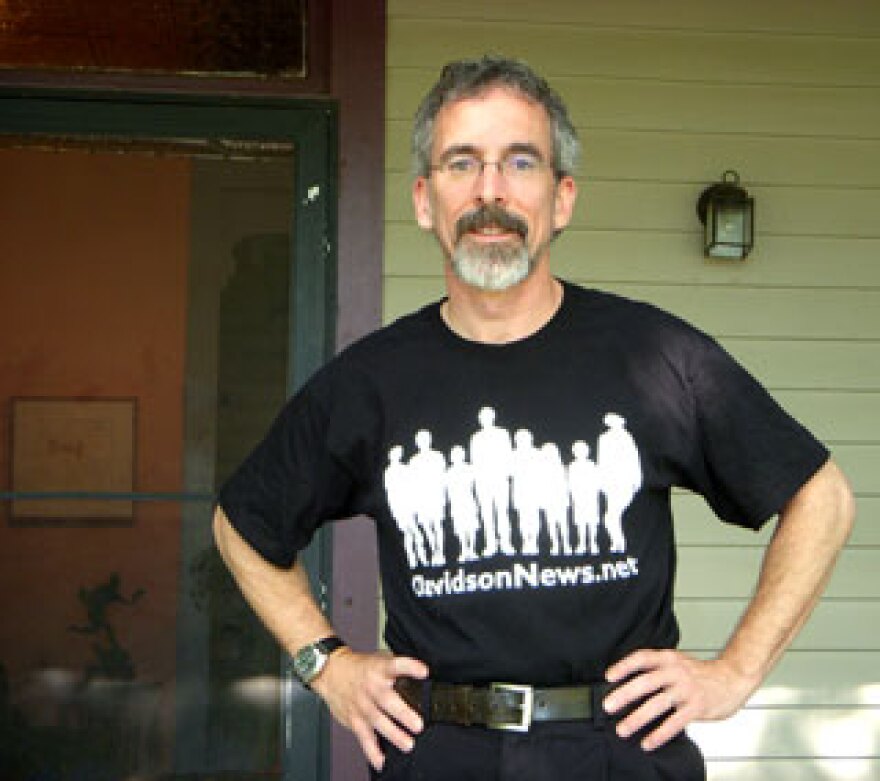http://66.225.205.104/0706DAVIDSONNEWS.mp3
The Internet has made it easier for news organizations to break news, update stories as they develop, and provide audiences with additional content. The problem is they're not making much money, if any, doing it. The poor economy has only compounded the problem. Today, we have the story of a journalist trying to figure out how to overcome these challenges. You may already be familiar with him. David Boraks is a freelance reporter and part-time announcer for WFAE. He also runs DavidsonNews.net. In this report, WFAE's Marshall Terry takes us through the ups and downs of trying to make a local news web site profitable. On a Saturday evening last month, more than 250 people gathered at a cafe in downtown Davidson for a fundraiser. The goal was to raise $50 dollars from 50 people. 75 people ended up giving $50 each. It was all for DavidsonNews.net. David Boraks is at the center of this event. In the 1990s, he was a business reporter for the Charlotte Observer. More recently, he worked for American Banker magazine. Boraks started DavidsonNews.net about 2.5 years ago. He had just returned from living in China and Taiwan, where his wife, a professor at Davidson College, had been teaching for a year. He wanted to catch up on what was happening around town, but he couldn't find much written about Davidson. So, he started a neighborhood newsletter. "And as I began writing about issues in the neighborhood I quickly expanded to some town-wide issues and I realized there was probably an audience for town hall news and other kinds of new from across the town," Boraks says. "So I expanded it into the DavidsonNews.net web site." A year ago, Boraks wasn't celebrating. He planned to shut down the site by the end of 2008 if things didn't improve. "It was coming along, but it wasn't coming along that fast," Boraks says. "I'm spending a lot of time on it. And I was really feeling like maybe it's not going to work." It's still primarily a labor of love. Boraks operates out of his home. He has two paid staff members, and two part-time reporters he says he pays whenever he can. In May, Boraks reached an important milestone. He wrote himself his first paycheck. He wouldn't reveal the amount; he just says it wasn't much. DavidsonNews.net is hyperlocal. It has news that, in most cases, larger media ignore. There's coverage of every town hall meeting, and profiles of newcomers, like the new school principle. It reminds you of a homey, small-town weekly newspaper. On the home page, for example, you can find endearing announcements of birthdays and anniversaries of people in town. You don't just learn that Libby Appel is turning 95, but also that she plays piano and can often be found "tickling the ivories" at the Pines retirement community where she lives. Davidson Mayor John Woods is a fan of the site. "Its very timely, very well written and very professionally presented," Woods says. "And obviously it's a great source of news to a local town that doesn't have a true newspaper media presence, nor radio for that matter." Boraks says DavidsonNews.net has about 12,000 hits a month. But there are a lot of popular news web sites. The bigger challenge is figuring out a way to make money. Al Tompkins of The Poynter Institute, a journalism training foundation in Florida, says the current formula of giving away news content isn't working. He believes more news organizations, large and small, will have to follow the example of the Wall Street Journal, one of the few newspapers to charge for its online content. "About 80 to 85 percent of everything on that site is unique to that site," Tompkins says. "It's built on the expertise and enterprise they have in that newsroom. So, why would you pay for it? You pay for it because you can't get it anywhere else. Because what you get from them is so good that it's worth something." Still, most people are used to accessing online news content for free. Will consumers be willing to pay to access the web content of their local newspapers, television, and radio stations? Boraks thinks there will come a time when online news won't be free. Just don't expect him to help lead the way. "I think we're too small to be the ones to set the trend," Boraks says. "But I think if we start seeing some of the major websites moving in that direction, it'll make it easier for all folks who run websites like mine to begin charging for access." Especially if he gives his readers what they don't get from larger organizations - in-depth coverage of Davidson's daily affairs.

